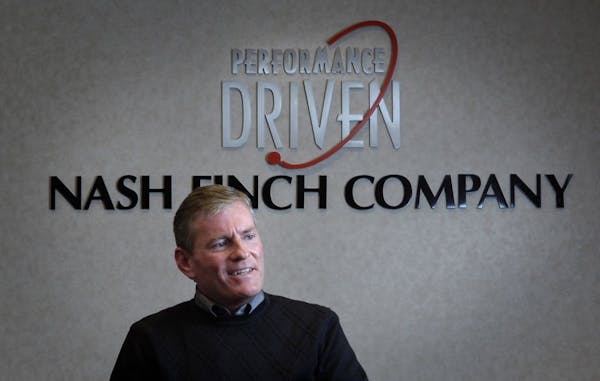A short history of Nash Finch Co. published to mark the company's 125th year in business three years ago is mostly a story about acquisitions.
The narrative mentions Food Centers, Inc., M.H. McLean Wholesale Grocery Co., Tidewater Wholesale Grocery, Military Distributors of Virginia and many more.
That's the way the wholesale grocery industry's leaders grew. Until it was time for they themselves to get acquired, a day that arrived Monday for Nash Finch with the announcement of a merger with Michigan-based Spartan Stores.
It may have been past time.
The food wholesaling business is in for a long, slow decline as the customer base erodes. The attrition of regional grocery store operators served by the likes of Nash Finch is projected to shrink the wholesaling industry by 2 to 4 percent annually, according to research analyst Ajay Jain of Cantor Fitzgerald.
Many of the smaller regional grocery store operators remaining in the business, competing in the shadow of Wal-Mart and Target, are presumed by analysts to be looking forward to the day they can exit the industry. They cannot effectively compete on the basis of price with Wal-Mart or offer as broad a product selection. Their cost of capital to expand and refurbish stores is far more expensive and they can easily be outspent on advertising.
Spartan, the buyer of Nash Finch, is not one of those industry giants. It's the ninth-largest wholesaler in the country and operates 102 stores as well. It's smaller than Edina-based Nash Finch in terms of annual revenue, but it's more valuable and thus will end up in control of the merged company.
Shareholders of Spartan Stores will own about 57.7 percent of the combined company, while Nash Finch shareholders will hold about 42.3 percent. Spartan will name seven members of the 12-person board of directors, and Spartan CEO Dennis Eidson will be CEO of the combined company.
"The outlook for both companies was quite similar," said Scott Mushkin, an industry analyst with Wolfe Research. "They were very well managed, but still not going anywhere."
Mushkin follows Spartan, based in Grand Rapids. For at least the past two years, he said, he has been asking Spartan's managers about Spartan's strategy, as it was clear to him that it needed to participate in the industry's consolidation.
The same conversation could have been had with the executives of Nash Finch. Its management team, much like Spartan's, deserves credit for years of taking care of customers, making payroll and paying its bills.
But its stock price before the deal with Spartan was announced, closing Friday at $25.43 per share, is about what shares were trading for in the month of July a quarter-century ago. Its 18 cents per share quarterly dividend was what it was paying investors every quarter 20 years ago.
"I give these interviews to Supermarket News once a year, on an analyst panel," Mushkin said. "I said a year ago that the industry needs to be desperately consolidated. We are way out of the Great Recession, yet business trends are still incredibly weak. The pricing, the sales volume, it just doesn't want to get any better. These types of transactions are inevitable."
Part of the appeal of Nash Finch to Spartan is its geographic footprint, distributing from 13 centers to about 1,500 independent and corporate stores in 31 states. Spartan operations are mostly in Michigan, and it's been Spartan's strategy to purchase stores in its wholesaler customer base.
In his conversation Monday on a conference call with analysts and investors, Spartan's Eidson explained that "historically we've always responded in the same way there — generally opportunistic, and the time has to be right. I do think you're seeing in the landscape a lot of consolidation pressure, whether it's in the distribution segment or the retail segment. So, we continue to be opportunistic."
Whenever you hear the word "opportunistic" mentioned by a CEO looking forward to a wave of consolidation you know the sellers should not be looking for a windfall or big payday. These most likely will be retail operators nearing retirement, or losing market share and fearful of losing money, or just plain tired.
The companies also told their investors Monday that there would be about $50 million to be taken out of the cost structure by the end of the third year of combined operations. Much of it clearly will result from the elimination of headquarters jobs as the two companies end up with one publicly reporting company and one set of senior managers.
So, this is the deal in a nutshell: The best opportunity for the new combined company to maintain or grow revenue is to take over its own customers and the best opportunity to boost profits is to let go of its own employees.
Nevertheless, this is clearly a deal worth doing for Nash Finch. There may not be a better one.
"I am kind of a simple-minded guy," Nash Finch CEO Alec Covington told investors Monday morning. "But any time that you see synergies approaching 50 percent of either company's overall [cash profits], you don't have to be the sharpest knife in the drawer to know that there's a good opportunity to be had in combining the two companies."
lee.schafer@startribune.com • 612-673-4302

Schafer: What do you really need to retire?

Schafer: How doing business can be a bit more like Christmas morning

Schafer: There won't soon be another opportunity to rethink the I-94 corridor

Schafer: The fruits of Honeywell's long-game dedication to quantum computer now being seen


